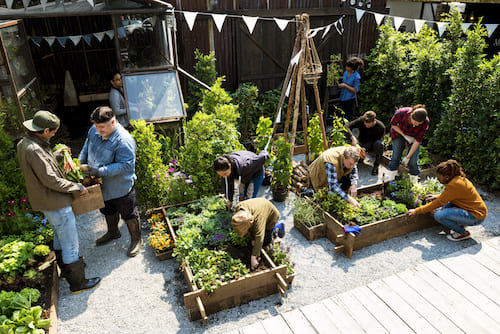November 18, 2019
By Stephanie Gilbert
 Mental health heavily influences our quality of life. So it makes sense that mental health, just like physical health, needs to be taken care of and maintained. And one way that it can be maintained is through finding a sense of community.
Mental health heavily influences our quality of life. So it makes sense that mental health, just like physical health, needs to be taken care of and maintained. And one way that it can be maintained is through finding a sense of community.
Community can be defined in many ways, but when simplified down to its most important element, community is all about connection. Community is not just an entity or a group of people, it’s a feeling. It’s feeling connected to others, feeling accepted for who you are and feeling supported. Having connection can help us feel wanted and loved.
We’re social beings, and we are not meant to live in isolation. Community is critical for us to thrive, especially for someone with mental illness who is already experiencing the common symptoms of loneliness and isolation.
Community provides many elements that are critical to mental health, but here are three of the most beneficial aspects.
Belonging
If you’ve ever felt like you don’t fit in, you know it can be a lonely experience. Community provides a sense of belonging — a group you identify as being a part of. This is different than conforming to be in a group. A true sense of belonging includes the ability for you to feel you are a part of the community as your true self. There is not anything you have to change to be a part of the community, but instead, you are embraced and appreciated for your unique qualities.
Support
Who do you turn to when you need something? Having people you can call on when you need to talk or need help with something can help you through difficult situations that might feel insurmountable alone. Knowing there are people who support you can help you feel cared for and safe, and can benefit your outlook on life.
Purpose
In community, people fill different roles. Perhaps you’re the friend who enjoys cooking and can be counted on to bring a hot meal over when someone is going through something. Or you’re the friend who others know they can call when they need to talk about their struggles. These roles can give you a sense of purpose through bettering other people’s lives. Having purpose, and helping others, helps give meaning to life.
When looking for a stronger sense of connection, you have to start with self-reflection. Being aware of what’s important to you can help you find ways to connect with other like-minded people.
Interests
What do you like to do? Perhaps you enjoy reading and could try joining a book club. Or maybe you’ve always wanted to try soccer and could try joining a team. The possibilities are endless, and you might find it easier to connect with others while doing activities you enjoy.
Values
What are your values? This category could include charities or volunteer work. Being of service is rewarding, and you can connect with others who have similar values or care about the same causes as you. A big part of building your community is giving back to each other, and finding volunteer work is a great way to start.
Beliefs
What do you believe in? If you connect with a spiritual practice or religion, try going to a speaking engagement, introductory class or service. Or if a political cause speaks to you, you can join a group that works toward a goal that’s meaningful to you. Connecting with something bigger than you is another helpful way to broaden your community.
Humans crave connection. Feeling accepted for who you truly are can give you validation and self-worth. Knowing there are people who support you and will be there for you when you’re struggling provides a sense of safety. And knowing you’re needed, that you have a purpose, reminds you that you are valued. Community provides all these qualities and more.
Where you find community is up to you; there is no one-size-fits-all. And if you haven’t found a strong sense of community yet, keep trying. No matter if your community is big or small, finding people you connect with is vital for your mental health. And remember, just as it’s important for you to find your community, it’s also important for others to have you as a part of their community. We all need each other.
Stephanie Gilbert, AMFT, is the program director and therapist at Mindfulpath, Inc. located in Calabasas and Santa Monica, California. She provides individual and group therapy, incorporating depth psychology, mindfulness practices and cognitive behavioral therapy. For more information about Stephanie, please visit mindfulpath.com.
We’re always accepting submissions to the NAMI Blog! We feature the latest research, stories of recovery, ways to end stigma and strategies for living well with mental illness. Most importantly: We feature your voices.
LEARN MORENAMI HelpLine is available M-F, 10 a.m. – 10 p.m. ET. Call 800-950-6264,
text “NAMI” to 62640, or chat online. In a crisis, call or text 988 (24/7).